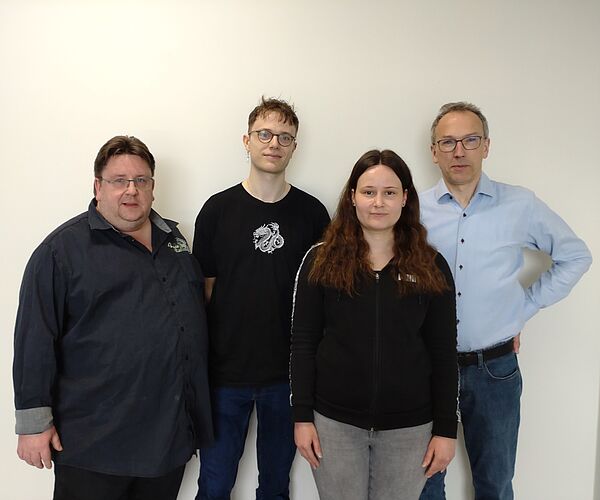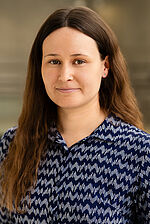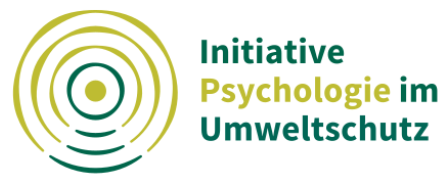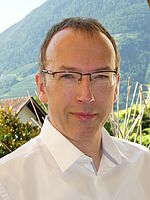Univ.-Prof. Dr.-Ing. Martin Jäschke
Please send an email for arranging a consultation.
Be sure to read the following instructions, if applicable to your request.
Questions, suggestions and criticism are always welcome!
But: Please be so kind and enrich the module by writing your contribution directly on Moodle into "Forum - Machen Sie mit ...". This way, everyone will benefit and can join the discussion - and I won't have to answer similar questions several times individually, for example. That would be a lot of help to me.
Thank you very much!
You are welcome to write your thesis with my supervision any time.
The most important steps in this case are the following:
I) Think for yourself
If you have not already done so, please reflect as specifically as possible(!!!):
1) Which topic or topics would be suitable for you? - Which ones definitely not so.
2) Which methods (literature research, calculations, measurements, observations, surveys, interviews, ...) would you like to use? - Which of them under no circumstances?
3) Whom would you consider as a second supervisor - Whom not?
II) Exchange your ideas with me
4) Contact me via email to schedule a consultation.
5) During this consultation we will clarify additonal details together. Possibly we will then already have found your topic or - if not - we will simply meet again.
As you can see, it is very important to me that you find a topic which motivates or even inspires you.
Regarding the thesis, please also note the following information:
- general rules (ASPO), which apply to all courses of study.
- special rules (BSPO), which additionally apply to your study program, e.g. for BIW-Bachelor or BIW-Master.
- for me, you have to add and adhere to the extended declaration of authorship (including AI; in German).
A selection of completed thesis topics can be found here.
Information on the layout of student term papers and theses can be found here.
In addition, we have compiled small handouts for you on the work steps of a term paper or thesis (in German):
0. Exposé
- Themenfindung und Forschungsfrage
- Literaturrecherche und Quellenauswahl
- Lesetechniken und Exzerpte
- Wissenschaftliches Arbeiten und Zitieren
- Wissenschaftliches Schreiben, Redigieren und Eigenkritik
In addition, you will find overview documents on various methods that you can use in your term paper or thesis (in German):
A) Interviews
B) Umfragen
C) Beobachtungsstudien
Important note:
These documents are intended to give you a first impression to help you choose your topic and the appropriate method - however, it is essential that you read relevant literature on the chosen method for your thesis! You will also find references to such in the handout.
When turning in your thesis:
Your supervisors receive an official e-mail on where to download your work after you submitted it. So there is no need for you to additionally send a link or PDF-file.
Inform yourself in advance about your topic, e.g. exceeding the standard period of study, part-time studies, leave of absence, ...
Consultation hours and more information can be found here.
The following are responsible ...
... for certificates of achievement according to § 48: BaföG-Amt, more information here.
... for all content-related BaföG questions: BaföG agency
... for issuing a certificate of placement in a particular semester: Student Administration Office
... for the certificate of assistance for graduation according to § 15 a: BaföG representative, i.e. me
Procedure:
I) You fill out the § 15 form
- Fill in the following boxes: All under the header, all under 1. and your name in 2.
- State a realistic estimate of the month and year in which you think you will have taken your last exam.
- Add two months to this estimated date and your graduation date will be published in AHOI. NOTE: The estimated time frame cannot exceed 12 months!
- Date and signature
II) You attach proof of your completed credits to date: ahoi printout or ToR
III) You come to one of my consultation hours and bring the above documents with you:
Wed, 16.04.2025
Wed, 23.04.2025
Wed, 07.05.2025
Wed, 21.05.2025
Wed, 04.06.2025
Tue, 17.06.2025
Wed, 02.07.2025
Wed, 16.07.2025
in each case at 1 pm
Please note:
- Individual appointments are not possible.
- Prior registration is not required.
- Please be sure to fill out your forms thoroughly in advance.
Consultation hours and more information can be found here.
I can only approve modules for which I am the module coordinator.
Please proceed as follows for recognition:
1) Complete the appropriate recognition form, which you can find here.
2) You send me the following documents by e-mail as clearly legible PDFs:
a) the completed recognition form mentioned in no. 1
b) all(!) required documents, i.e. for all modules that you wish to have accredited by me, in each case
-- title, amount (ECTS or CP or similar) and content of the module according to the module card or equivalent and
-- Type, extent (duration!) and result of all examinations.
The certificates must be official documents from your “old” university. The documents must be complete. Please check this BEFORE you send the documents to me!
3) I will carry out an examination on the basis of the documents submitted and inform you of the result. You come to my consultation hours bringing all original documents and a recognition form filled out with your data. Consultation hours and further information can be found here.
Please contact the respective person matching your request.
I will not forward your e-mails!

Key Areas
Vita
Academic career
1987-1993 Diploma in Physics, University of Göttingen
1998-2007 Diploma in Environmental Science, University of Koblenz-Landau, while in employment
2005-2011 Master of Organizational Psychology, Fern-Universität Hagen, while in employment
2008-2013 Engineering Doctorate at the Leibniz Institute for Ecological and Regional Development (IÖR) and at the TU Dresden, Faculty of Architecture, while in employment.
Topic: Noise Mapping and Quiet Areas
Job experience
1993 - 1995 University of Göttingen
1997 - 1999 Environmental Office, City of Göttingen
1999 - 2004 Regional Council Darmstadt and Gießen: Immission and Radiation Protection
2005 - 2016 Hessian State Office for Environment and Geology: Immission Control
since 2016 HafenCity University Hamburg

Image © Oliver Reetz
Research Associate
Associated Member of the Research Training Group
"Urban Future Making"
I can take on the second supervision of your thesis if the topic matches my expertise.
For this, Prof. Jäschke does not necessarily have to be your first supervisor.
Supervision will be provided following your initiative, i.e. you can contact me via email at any time if you have questions regarding content or methodology. For more extensive queries, we will arrange a personal or digital consultation appointment.
I explicitly do NOT want your thesis in the form of a printed copy.
Writing your thesis in English is also possible.
Collection and creation of Open Educational Resources and their publication on the platform
of the Hamburg Open Online University (HOOU), in order to provide information developed
according to scientific standards, about the socio-ecological local and global entanglements
of building materials to a broad public in a narrative way;
lead: Prof. Sabine Hansmann, head of the department "Architecture, Space and Society".
Project website:
https://blogs.hoou.de/materialnetworks/
Uhrig, Alisa (2019). Ausblick: Nachhaltige Digitalität? Interview zum Thema Digitalisierung in und für
umweltsoziologische(r) Forschung. In: Lukas Sattlegger/Larissa Deppisch/Markus Rudolfi (Eds.).
Methoden umweltsoziologischer Forschung. Tagungsband der 15. Tagung der Nachwuchs-
gruppe Umweltsoziologie. Frankfurt am Main, ISOE - Institut für sozial-ökologische
Forschung, 167–175.
Available online (in German)
https://www.researchgate.net/publication/346084263_Ausblick_Nachhaltige_Digitalitat_Interview_zum_Thema_Digitalisierung_in_und_fur_umweltsoziologischer_Forschung
Bachelor
- Engineering Mathematics I and II
- Theoretical-Conceptual Basics
- Traffic Planning and Infrastructure
- Calculating Noise and Planning Noise Reduction Measures
- Environmental Protection
- Environmental Protection and Scientific Work
Master
- Paradigm Shift
- Planning Procedures
- Immission and Noise Protection
- Noise Protection (TU Hamburg)
The cross-curricular project MINTFIT Hamburg offers prospective STEM (German: MINT) students anonymous and free online tests and courses in mathematics, physics, chemistry and computer science (www.mintfit.hamburg). In 2019/2020, the HCU co-developed the MINTFIT computer science test, which prospective students can use to prepare for computer science content in their STEM studies. For this purpose, computer science lecturers throughout Germany were surveyed on topics relevant to them and the results were scientifically published.
In the MINTFIT e-assessment part of the project, lecturers at Hamburg's universities are supported in conducting electronic examinations. At HCU Hamburg, mathematics exams are being converted from paper to digital. For this purpose, tasks were redesigned and implemented in an examination system (WeBWorK). This required a lot of preparatory work, but offers many advantages, as the exams are corrected "at the push of a button", students receive their results faster and, for example, paper is saved as well. The testing center of the Hamburg MINT universities, which is set up on the TUHH campus and also used by the HCU, consists of 100 laptops. It is coordinated by the Arbeitsstelle MINTFIT Hamburg (AMH), which is a joint institution of the Hamburg MINT universities.
You are welcome to write your thesis with my supervision any time.
The most important steps in this case are the following:
I) Think for yourself
If you have not already done so, please reflect as specifically as possible(!!!):
1) Which topic or topics would be suitable for you? - Which ones definitely not so.
2) Which methods (literature research, calculations, measurements, observations, surveys, interviews, ...) would you like to use? - Which of them under no circumstances?
3) Whom would you consider as a second supervisor - Whom not?
II) Exchange your ideas with me
4) Contact me via email to schedule a consultation.
5) During this consultation we will clarify additonal details together. Possibly we will then already have found your topic or - if not - we will simply meet again.
As you can see, it is very important to me that you find a topic which motivates or even inspires you.
Regarding the thesis, please also note the following information:
- general rules (ASPO), which apply to all courses of study.
- special rules (BSPO), which additionally apply to your study program, e.g. for BIW-Bachelor or BIW-Master.
- for me, you have to add and adhere to the extended declaration of authorship (including AI; in German).
A selection of completed thesis topics can be found here.
Information on the layout of student term papers and theses can be found here.
In addition, we have compiled small handouts for you on the work steps of a term paper or thesis (in German):
0. Exposé
- Themenfindung und Forschungsfrage
- Literaturrecherche und Quellenauswahl
- Lesetechniken und Exzerpte
- Wissenschaftliches Arbeiten und Zitieren
- Wissenschaftliches Schreiben, Redigieren und Eigenkritik
In addition, you will find overview documents on various methods that you can use in your term paper or thesis (in German):
A) Interviews
B) Umfragen
C) Beobachtungsstudien
Important note:
These documents are intended to give you a first impression to help you choose your topic and the appropriate method - however, it is essential that you read relevant literature on the chosen method for your thesis! You will also find references to such in the handout.
When turning in your thesis:
Your supervisors receive an official e-mail on where to download your work after you submitted it. So there is no need for you to additionally send a link or PDF-file.
- Moosbasierte Lösungen zur Feinstaubreduktion im urbanen Raum. Möglichkeiten und Grenzen – eine vergleichende Untersuchung
- Verträglichkeit von Protected Intersections mit Bedürfnissen des Fußverkehrs. Ein Vergleich regelkonformer Kreuzungen in den Niederlanden und Hamburg
- Pavement-Management-System (PMS) für kommunale Straßen: Untersuchung am Beispiel der Stadt Hamburg
- Dimensionierung des Straßenoberbaus von Bundesfernstraßen. Vergleich der Regelwerke RDO mit RStO
- Anforderungen an ein systematisches Erhaltungsmanagement für Nebenflächen. Untersuchungen am Beispiel der Freien und Hansestadt Hamburg
- Einwegbecher in der Cafeteria der HafenCity Universität Hamburg. Studie zur Diskrepanz zwischen Umweltbewusstsein und Umweltverhalten
- Untersuchung des Verkehrs- und Mobilitätsverhaltens an der HafenCity Universität
- Entwicklung von Einsatzkriterien für Planungsvarianten des Radverkehrs mit Hilfe von Experteninterviews. Erstellung von Planungsentwürfen anhand einer ausgewählten signalisierten Knotenpunktzufahrt
- Umweltverträglichkeitsprüfung von Neubaustrecken im Schienenverkehrsnetz. Lückenschluss im schienengebundenen Nahverkehr zwischen Buxtehude und Altona, Hamburg
- Im Dialog mit der Nachbarschaft. Untersuchung und Evaluation einer projektbegleitenden Baustellenkommunikation bei privaten Bauvorhaben
- Wie wirken sich energetische Sanierungsmaßnahmen auf Umwelt und Bewoh-ner aus? Bewertung am Beispiel von Wohngebäuden in Mümmelmannsberg
- Schalltechnische Untersuchung des Gebietes Hillenklint (Seevetal. Kombination der Ergebnisse aus Befragung, Messungen und Berechnungen
- Elektromobilität – Analyse der Nachhaltigkeit durch Experteninterviews
- Verkehrssicherheit im Straßenraum am Beispiel Alte Landstraße: Analyse und Verbesserungspotential
- Vergleich der Lebensqualität in den zwei Lübecker Wohngebieten St.-Annen-Straße und Sternenring
- Diesel-Durchfahrtsbeschränkungen in Hamburg: Eine Analyse auf Grundlage von Befragungen Betroffener am Beispiel der Stresemannstraße
- Umgestaltung einer Straßenkreuzung zu einem Kreisverkehr. Vergleich zwischen der herkömmlichen Planungsmethode und BIM
- Vergleich des Heizvlieses „Feegoo“ mit einem konventionellen Heizsystem
- Was kann getan werden, um die Kosten im Rahmen der Gebäudezertifizierung zu begrenzen am Beispiel von ausgewählten Bauteilen
- Experteninterviews zum Fluglärm in Hamburg. Wer will was und was wäre gemeinsam möglich?
- Licht in der Stadt
- Baulärmschutz in der Praxis – explorative Experteninterviews

Are you interested in environmental protection and psychology?
Then the Initiative Psychologie im Umweltschutz e.V. (IPU; engl.: "Initiative for Psychology in Environmental Protection") is the right place for you!
Here you will find:
- the latest findings in environmental psychology research
- online lectures and other educational materials
- networking opportunities and conferences
- internship platform
- theses
- and much more!
Discover the world of environmental psychology at
https://ipu-ev.de/ (in German)
Key Areas
Topics
- Prevention and control of environmental stress factors
- Protection of unstrained areas
- Noise, light, air, ...
- Quality of life, well-being and health
- Organizational development, communication, mediation, ...
Methods
- GIS, computer simulations, calculations
- Measurements
- Interviews, surveys, observations
- Literature and data analysis
- ...




